
A lottery is a form of gambling in which people pay a small amount of money (to buy a ticket) for the chance to win a large sum of money. Most states have legalized and regulated lotteries, which usually raise money for public benefit or charitable purposes. Prizes are usually cash, but some states award goods or services instead. Lottery tickets can be purchased at many places, including gas stations and convenience stores. Some states even sell the tickets online. The odds of winning vary significantly from drawing to drawing. Often, the odds are displayed on the tickets and advertised by the lottery operator.
When a person purchases a lottery ticket, they have to weigh the expected utility of the monetary loss against the anticipated utility of the non-monetary gain. If the entertainment value of winning the lottery is high enough, then a person might choose to play even though they will lose some monetary value. The same is true of other forms of gambling, such as playing video poker.
In modern times, lottery games are often used to raise funds for state and local projects, such as education, road construction, or improvements to municipal buildings. They are also popular with private businesses, which often offer their own lotteries to raise money for commercial ventures or charity projects. The prizes for these contests can range from a few hundred dollars to millions of dollars. The lottery has been a subject of controversy, and some people have argued that it encourages gambling addiction, especially among the poor.
The history of the lottery is complicated, with both positive and negative aspects. During the Roman Empire, the emperors used lotteries as a way to distribute valuable items, such as slaves and property, during Saturnalian celebrations. Later, the term became associated with a process of assigning plots of land to settlers, which was used by colonial America and in the American Revolution.
Today, the lottery has a wide audience and is one of the most popular forms of gambling in the world. Its popularity is rooted in its allure as an opportunity to make money and avoid paying taxes. But the truth is that most of us will never win the jackpot, and even those who do often find themselves worse off than before they won. The lottery is a dangerous form of gambling, and it is important to understand the odds before making a decision to purchase a ticket. In this article, we’ll examine how the odds of winning a lottery game are calculated and how to determine whether it is worth playing. We’ll also look at some of the largest jackpots in lottery history, and discuss some of the most common misconceptions about the game. Finally, we’ll provide some tips on how to maximize your chances of winning the lottery.